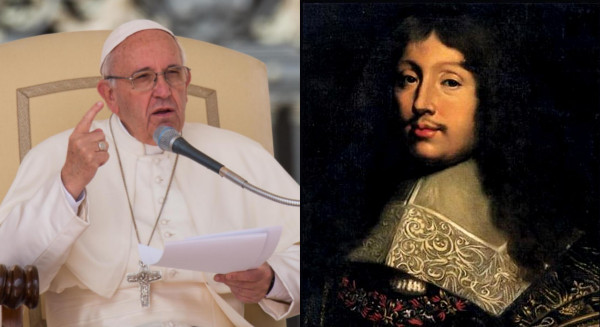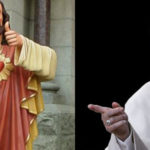Besides, atheists are hypocrites anyway.

Francis vs François.
Commenting on the umpteenth controversy generated by Pope Francis’ utterances, this time against the hypocrisy of some Catholics. Let’s see.
Proposition #1:
And how often we see the scandal of those people who go to church and are there all day long, or go every day, and then live by hating others or speaking ill of people. This is a scandal! It is better not to go to church: living this way, as if they were atheists.
(Pope Francis)
Proposition #2:
Hypocrisy is the homage which vice pays to virtue.
(François de La Rochefoucauld)
But wait. Let’s add a further step.
Proposition #3:
We Christians go to Sunday Mass to encounter the Risen Lord, or better still to allow ourselves to be encountered by him, to hear his Word, to nourish ourselves at his table, and thus to become the Church, that is, his mystical living Body in the world.
[…] How can we practice the Gospel without drawing the energy necessary to do so, one Sunday after another, from the inexhaustible source of the Eucharist? We do not go to Mass in order to give something to God, but to receive what we truly need from him.(Pope Francis)
From 1, 2 and 3 (which btw sounds eerily in contrast with #1) it follows -just applying logic- that #1 could become…
Proposition #4:
It’s better to avoid hypocrisy than to pay homage to virtue.
It’s better be coherent in evil than to expose oneself to God’s Grace.
If we can’t see ourselves as models of virtue, let vice expand until it engulfs everything, since it’s convenient and consistent, instead of struggling to cope with our inner contradictions; instead of showing a sign of contrition which would condemn our vice and make us feel embarrassed.
Notwithstanding the fact that going to Mass, even as hypocrites, could change us in the long run.
The call to a supernatural Grace received in the Eucharist seems also to be out of the equation.
Clearly #1, once brought to its extreme consequences, is unacceptable and unworthy of a pope. Even when intended as a provocation, meant to introduce a different proposal.
Don’t get distracted by distortions.
Many journalists caused a stir by morphing the message into something slightly different: “It’s better to be atheists than Christian hypocrites”. No, the issue here was Christians meant to live as atheists, but as a suggestion it’s not less problematic. (And btw, indirectly it also serves as a further opportunity to normalize atheism within the Catholic culture.)
The Defenders of Normalcy, those I once dubbed “the downplayers”, were quick to respond with a positive interpretation: nothing to see here, it’s just the pope using a paradoxical image but coming up with a constructive proposal, calling the faithful to become coherent in good deeds.
His harsh words would spur us to choose the right path; our call felt more vividly thanks to the shocking contrast. Here’s his complete sentence, in fact:
…It is better not to go to church: living this way, as if they were atheists. But if you go to church, live as a child, as a brother or sister, and bear true witness, not a counter-witness.
It is true that we need to be shaken from our torpor from time to time, especially considering how many outsiders view Catholics (usually through a malicious lens) as those who play the part but are small-minded and selfish (when not scoundrels).
But a pope is responsible for his words and for their consequences. Clarity and precision aren’t optional.
It’s preposterous to pretend the Authentic Magisterium consists in the painfully cumbersome explanation that others manage to offer in a second time, in an attempt to defuse the nth scandal caused by his utterings (the hermeneutics of the faithful yet moderate vaticanista). We can’t really make do with such interpretations, maybe reaching 1 in 1000 faithfuls, while the other 999 “misunderstood the message because of the journalists”.
This is far from being the first incident. Some of his declarations released during (undoubtedly sloppy and unreliable) interviews were bordering on heresy.
Yet somehow the pope insists on following this path, letting the media run with their more or less heterodox/revolutionary interpretations.
We’ve been told we should focus on the context, not on isolated phrases. But then it’s even worse, because by examining the context we determine that the juicy (I mean poisonous) bits are those uttered spontaneously, veering off the prepared script: that’s when the hero of the new Church speaks, the beloved man Bergoglio; casting a shadow on the official, boringly predictable content delivered in his capacity as pope.
No, the laws of the media system are ironclad and clear; Francis seems perfectly at ease playing this game.
“Live as an atheist rather than becoming like those typical Catholic bigots” is the true message that went through. “Live as a son or daughter” is a semi-invisible message there’s no point trying to push now, since it’s become a pathetic excuse for the hopeless optimists who don’t want to acknowledge reality: a destructive force being deployed in front of them.
As it’s been pointed out by Stefano Fontana, this episode follows another two disturbing pontifical utterings that marked the beginning of 2019: the unacceptable parallel between Christianity and Revolution, plus the declaration that the Virgin Mary had to work to become holy, since we aren’t saints at birth (which would negate the dogma of the Immaculate Conception)…
As Fontana puts it, those three examples demonstrate a deliberate choice to use a provocative language, one that is intentionally imprecise; with dire consequences since in the long run it changes the meaning of the content delivered and of papacy itself:
if you want to give birth to a new way of thinking you need to speak in a new way.
Where the significance of this episode shines: in his splitting the Pope in two.
We should face the fact that propositions 1 and 3 are both signed Pope Francis but contrast each other, as if they came from different minds.
And in fact, as I said, the #1 is spontaneous: conveying his thought in the signature Bergoglio style, which is coarse, disgusted and intellectually poor. The # 3 (from 2017) is instead part of a prepared catechesis, realistically coming from a collaborator. The pope was just the public figure reading it in public as per his role.
There’s no surprise here then: his incoherence in teaching is only apparent.
Ironically he’s also the one inviting you to a sort of coherence in not behaving as a Christian, if you can’t behave like an exemplary faithful.
The Pope is vox Dei, but Bergoglio is vox populi.
The former deals with the formalities that are part of the office, the latter focuses on becoming popular.
No one before him was capable of splitting the role of the pope in such a remarkable fashion.
We’ve got two popes alright, but not in the sense people usually think.
The Humble Priest of the Worldwide Parish Bergoglio shines through his overshadowing Pope Francis.
The crux of the matter escaped most, as always.
A revealing detail: the Italian Catholic TV called TV2000, owned by the Italian bishops, corrected the Pope’s words on their Facebook page.
The key passage there in fact becomes:
those people who go to church and then live by hating others
while the original audio was:
those people who go to church and are there all day long, or go every day, and then live by hating others
Did you catch that? They tried to discreetly censor the inconvenient thought that the Pope expressed: a disapproval for, let’s say, an overzealous religious practice.
The whole expression sounds harsh, imprecise and meaningless, with a sort of repetition describing an implausible imaginary scenario: who would those Catholics be, spending the entire day in church? Not even cloistered nuns!
Immediately after saying that, as if he were to correct his own words, the deplorables become those Catholics that go to church every day. Yes, there are some who do, but they have become quite rare. A few decades ago a daily mass was a good habit for millions of people. Now it’s become even problematic to find an open church, imagine if you could find time to attend while participating in today’s “rat race” modern life.
Now… we’re supposed to find -within the confines of such a minuscule demographic- those irredeemable hypocrites who dedicate endless hours to inane prayers while at the same time being full of hate and badmouthing other people…
Who the heck is he ranting against?!?
This is the issue. Notwithstanding the journalists trying to make the story about a maxim like “it’s better to live as atheists”.
How come he’s fuming against such a laughably implausible Catholic character?
Such incoherent thoughts reveal the mental disposition laying behind them more than a thousand prepared speeches.
It’s precisely his switching the description halfway through that shows how he wasn’t really paying close attention to his stream of consciousness. Those words don’t express a thought but rather an emotion that becomes a will.
A decades-long frustration against a certain type of Catholics: those who defend Tradition, try to close the door to creative innovations, politicization, cleanslate-ism.
For their unwillingness to join the revolutionary bandwagon they’re accused of being petty-minded, deficient in their religious virtues, unwilling to “love” those human shields that are alternatively employed to undermine the foundations of Catholic moral teachings (once upon a time it was the schismatics and the heretics, recently it was about abortionists, divorced people who remarried, drug addicts and the like; nowadays gays, transsexuals and immigrants are all the rage…)
If morals cause discontent in some groups of people, and the revolutionaries are successful in depicting them as victims, then morals become oppression. It’s logical, isn’t it?
The fact that this leftist logic has become dominant even in the Catholic Church aptly illustrates what kind of storm is brewing.
No matter how we put it, this is the crux. This isn’t the first occasion in which pope Bergoglio reveals his contempt for those who try to defend the Catholic faith from dissolution.
Are you falling behind? This means you’re rigid and incapable of love, it would be preferable if you left the Church!
There’s a striking analogy with the reflections I made on Hillary Clinton when she came up with the famous basket of deplorables gibe: basically commentators focused on the deplorables, while the revealing detail of her sociopathic mind was actually the basket, where she’d ideally throw her unworthy adversaries. The act of misspeaking betrays the real feelings.
Forget about the “living as atheists” detail, observe instead a pope who’s disgusted by those who are most assiduous to Mass.
Maybe one of the most disturbing aspects of this attitude is that Bergoglio expresses a prejudice that comes directly from the left.
In his mind the stereotypical anti-Catholic slanders are true: the worst of the worst, the narrow-minded hypocrites, would be those Catholics who appear more attached to the tradition and assiduous in receiving the sacraments.
Vox populi, as I said. Reversing the perception of where you could expect to find virtue; perfectly in tune with the spirit of the times, i.e. with those popular rants against the Church -and priests in particular- that infest social media: all the evils in the world were and are caused by the Catholic Church, it seems.
The holier the target, the more intense the need to find some excuse to attack and smear it (Which of course helps the least faithful in the clergy gaining even more prominence and undermining even more the moral doctrine they were expected to uphold).
Oh, the Pope isn’t taking part on those excesses, you may say. But here we’re not just about his choosing to side with those who are far off against those that are near, in the vain attempt to gain some popularity.
This is about sharing a common understanding. A cultural shift. Taking the mistakes and deceptions of the post-Vatican II age -coming from progressive circles of course- to the extreme consequences.
Siding with prostitutes and public sinners; fighting against the alleged pharisees, described as perfectly dressed and groomed, smugly prideful.
Choosing to ignore the fact that Jesus Christ is the doctor, not the lawyer defending the unrepentant sinner!
If you’re not proclaiming: “Repent and sin no more” it means you’re in the Enemy camp.
It’s no secret anymore: this pope disdains the distinctly Catholic stuff, the “excesses”.
Not all of them, at least for now; after all he’s still a man from a different time. But he’s an initiator; he doesn’t know where this revolutionary movement he’s promoting will go. He’s only happy to see it soar, following its path. By definition the path that the Holy Spirit chose, it goes without saying…
That’s why you read about his having a priest -who dared to still wear a cassock- removed from his Santa Marta residence. That explains also the scene where he forces an altar boy’s hands apart, since it seemed to him they were too rigidly conjoined in a gesture of prayer…
It’s the spirit that makes him comment disparagingly on a prayer group that naively and playfully boasted about the exact number of prayers they delivered…
His impatience must have deep roots.
He’s really representing today’s progressive Church: modern art pieces that cost a fortune and look ugly (at times Satanic) put in place of ancient masterpieces sold or sent to a museum; churches that look like bizarre industrial warehouses, you name it. This is the Church that removes the tabernacles and puts a throne in their place.
We really can’t be surprised if we witness the triumph of the enemies of the Faith, supporting the infamous Liberation Theology and all sorts of wacky experiments, while movements and congregations suspected of traditionalism, dedicated to upholding the doctrine or to contemplative life are facing obstruction or even put under temporary receivership.
The most prestigious Vatican posts often seem to be given to the worst prelates and bishops he could find, either as 1. worthless yes-men, 2. shady characters with skeletons in their closets, 3. fanatic ideologues
or a combination of the three.
Of course: they represent the categories that embrace the revolution with more zeal.
In his head he’s fighting against old fashioned ideas and bigotry. Against those close-minded faithfuls who complain (!) about their Church crumbling down around them, plus they dare to badmouth the lost sheep.
Final invective.
You, O pope, who at a crucial moment uttered the infamous: “Who am I to judge?”.
How dare you put a brother on the spot, forcing him/her to choose: either leaving the Church as a reject or somehow being a perfect witness of the Gospel?
What an astonishing lack of charity: presenting us with a dramatic fork in the road, all or nothing.
Is this pastoral?
Thank God we’re part of an inclusive Church!
The field hospital where those who want to be treated with fanciful remedies, herbal concoctions and homeopathy, as an opportunity to stay comfortably put in their illnesses, are welcomed with open arms, while no one is really cured anymore. In the meantime many who were already in, but only for an ingrown toenail, may now merrily contract cholera.
The only true sin is to appear rigid and judgmental.
That’s a special case: then the merciful read your mind and decree that you’re a hater and it would be better for everyone if you left.
No, I’m sorry, we’re not visionaries. It would be quite difficult even to compile a partial list of the occasions in which he acted in ways unbecoming of a pope.
There comes a moment when you’ve had enough. The necessity for a laymen to avoid disrespecting the Vicar of Christ cannot become a weapon of Mass destruction.
It’s come to this. The least Christian you are, the least Catholic you are, the more you’re welcomed, reinforcing your self-righteous prejudices. Bonus points if you’re aligned with the fashionable leftist mantras of Social Justice.
Appendix. By the way. Are atheists hypocrites after all?
Let me explain the subtitle of this piece.
I know, generalizations are always a bit unjust; the phrasing was provocative; but the concept has merit.
We all are hypocrites one way or another, of course. It’s impossible to measure up to our very own standards. And this is due to the Original Sin. But notice: those who indulge the basest instincts, refusing any moral law, are the worst hypocrites of all, since they’re telling themselves that all is well while their life is falling down a precipice, and deep down they know it.
It is better to pretend everything is OK, talk the talk without walking the walk, than to pretend everything is OK while refusing to walk the walk but in addition not even talking the talk.
Therefore there’s no upside in not going to church, since by “freeing” yourself from the shackles of appearances you’ll cease feeling the spur of an ideal, the call to being good, but you’ll fall prey of other, more insidious hypocrisies nonetheless.
In fact by running away from morality you won’t be content with just silencing your conscience, you’ll then need to suppress a feeling of emptiness. Inside.
But atheists in particular occupy an even less defensible position, thanks to what we could call their adaptive morals.
When by virtue of not believing in God you end up having no constraints (in fact you cannot even motivate any form of ethics) a world of possibilities opens up:
1-you’re free to follow any whim while at the same time playing the role of a free spirit, a completely open-minded person.
2-You could also follow conventions: some arbitrary moral principles, that are actually rooted in religion but you could pretend otherwise. How noble of you. In fact you’d act as an outstanding citizen without any reason at all, ostensibly just because you’re good, denouncing the pettiness of others who act morally just out of fear, convenience or religious conditioning…
3-You can also dynamically switch between 1 and 2, becoming a bit of a moralist and a bit of a libertine, as you please. Constantly congratulating yourself for your superiority, conjugating a love for justice with an indomitable free spirit… Yeah, right.
Living as atheists is living as hypocrites because you could always pretend things make sense after you rejected the light.










































